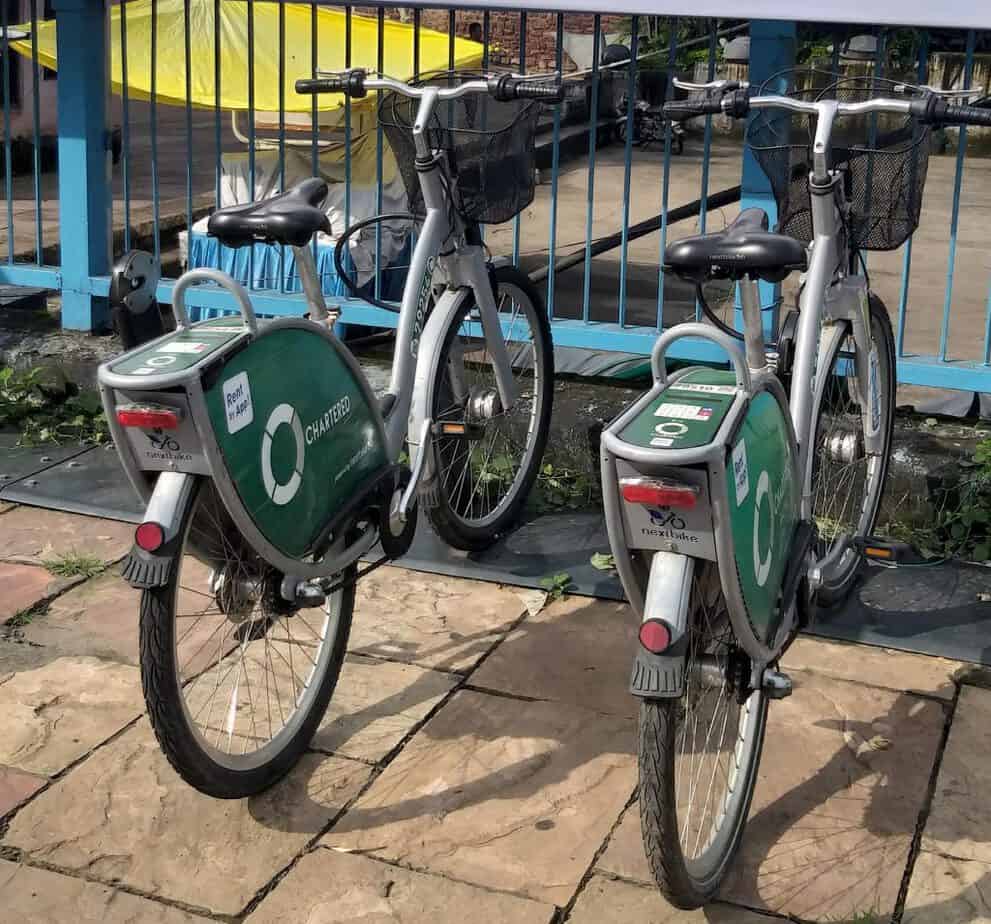The intentions were noble, but as usual got derailed by poor implementation. Bhopal’s smart bicycle service, first introduced two years back, is a typical example. The main reasons for the lukewarm public response to it were the initial high rental cost, inadequate number of cycles available and poor choice of location of the cycle rental stations.
The government addressed the first issue recently by cutting the one-time registration fee for renting a bike. To encourage students, women and elderly people to rent a bicycle, the earlier one-size-fits-all fee of Rs 500 was cut to Rs 50 for college students and Rs 100 for senior citizens and women.
The registration is a one-time, refundable, security deposit. After registration, users are charged a monthly rent of Rs 149 for 30 minutes daily. Using the bike for more than 30 minutes a day entailed an extra charge of Rs 5 for every 30 minutes or part thereof. It was found that bicycle use was maximum during mornings (5 am – 8 am) and evenings (6 pm – 8 pm).
Public bicycle sharing scheme in India is yet to realize its full potential even though the project is being tried out in many cities. The idea of public bicycle sharing was first mooted by the Union Ministry of Urban Development (MoUD) in 2011. The basic purpose was to underscore the advantage of using bicycles within a self-sustainable Public Bicycle Sharing (PBS) scheme framework in urban areas to provide a low-cost, environment-friendly and convenient mobility options to residents.
A slow start
Bhopal was the first city to introduce the bike sharing scheme among the seven cities in MP selected for smart city projects. In the first phase, 50 locations were chosen for setting up bicycle rental stations. This project encourages the use of bicycles for commuting short distances.
Work is in progress on the second phase to install bicycle rental stations near all the city’s residential and business centres. Initially around Rs 3 crore was allotted for the project. People can register by signing up on the website or on app.
People can rent a cycle from any cycle rental station at any time of the day, use it to go anywhere they need to, and return it to a cycle station nearest to their final destination. The scheme is particularly useful when people need to travel short distances, usually up to 5 km. School and college students in particular have especially liked the scheme. A total of 500 bicycles have been in operation in the city for the last two years from about the 50 rental stations.
Statistics show that 1200 people use them daily, while around 65,000 people have registered for their use. Smart city authorities claim that the number of men and women among the registered users are roughly equal. Women are also using these bikes, though at the moment their numbers are low. “The administration should create awareness about this bike sharing service, only then will more people start using this service,” said Smita Pradhan, who uses it occasionally.
Authorities said bike sharing scheme has various advantages as it promotes non-motorised transport, reduces use of private vehicles lowering pollution and reduces fuel consumption. The scheme has been running in many Indian cities, being managed by private companies and government agencies. But it has not been problem free anywhere.
Need to create awareness
In Bhopal, the main problem has been the lack of proper cycling infrastructure, like dedicated cycle lanes, and end-to-end connectivity. Puneet Khare, a college student in Bhopal, said cycle rental stations were not set up near key high footfall locations, like bus stops and busy markets. “Even so, the scheme is quite popular among students, and many of my friends and I find it convenient and economical,” said Puneet.
A majority of those using bikes in Bhopal are quite prompt in returning bikes at the rental stations. However, there are some who are not disciplined at all, leaving the bikes wherever they want. “I believe it is one of the best services that was launched in Bhopal,” said Ankit, who uses this service every Sunday. “Although the number of bikes is not much, but still I enjoy riding in the evening and the number of users is increasing day by day.”
Another regular user Amitabh Pandey is of the view that the government has failed to create awareness about the project. “The administration should regularly organise programs to teach people about the smart bike sharing project”.
According to the Bhopal Smart City Development Corporation Limited (BSCDCL), work is on to connect the rental stations with all colonies within a 500-meter radius. The authorities plan to increase the number of rental stations to 100. The rental stations currently are set up near the passenger waiting rooms on the Bus Rapid Transport (BRT) corridor close to the city’s main roads.
In selecting the locations, preference was given to places near large colonies or those frequented by a large number of people like parks and other public places and places visited or frequented by a large number of students, said a smart city project official.
Nitin Dave, Media Manager, Smart City, said boards giving details about how to rent bicycles are installed at all stations. “We shall make arrangements to install new boards at stations where they have gone missing or have been removed by some people. Broken boards are being repaired,” Nitin added. However, Yogesh Kumar of Panchsheel Colony, on arriving at a rental station outside Journalist Colony recently found that the board giving information about how to rent and use the bicycle was missing. “Only an empty iron frame was there,” said a disappointed Yogesh.
